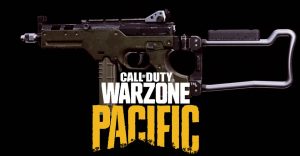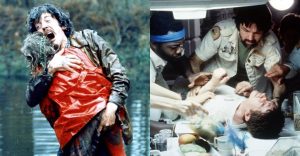‘Fury’ Interview: Jon Bernthal Talks Savagery & Brotherhood

In his new movie Fury, writer/director David Ayer explores corrosive effects of war via the examination of a battle-hardened tank crew, who must spend a day breaking in a fresh new recruit named Norman (Logan Lerman). That tank, The Fury, serves as home to reluctant leader Wardaddy (Brad Pitt); devout man of faith Boyd Swan (Shia LaBeouf); stoic Mexican driver Trini Garcia; and backwoods redneck Grady ‘Coon-Ass’ Travis.
The character of Grady happens to be one the most dynamic and unpredictable of the bunch; as the ammunition man, Grady’s efforts are the only thing that keep the Fury’s cannon stocked, and the tank one shot ahead of the enemy’s deadly artillery. Grady also happens to be a man whose nearly been unhinged by his fears – and nearly consumed by the beast inside every man, which war has a funny way of bringing out. (Read our official Fury Review.)
We sat down with former Walking Dead star Jon Bernthal in NYC, to talk about the grueling process of making the film, and working with co-stars like Brad Pitt and Logan Lerman. BE WARNED – SPOILERS FOLLOW!
–
Fury Interview: Jon Bernthal (Spoilers)

Screen Rant: One of the really impressive things of this very impressive movie, first of all, is just how much it kind of almost functions like a short story. We kind of just come into this and a lot of that only works so well because of what you guys are able to kind of imply and convey about your characters through the performances.
When you were preparing to play this, how much of this backstory, even though we only get to see certain things float to surface, how much of this had you kind of prepped in your head for backstory and could you share any of what that was?
Jon: Sure, man. There’s a lot in the script that didn’t make it to the screen, obviously. And there was a lot in the script that taught us about the backstory of these characters, and what’s there is there and what’s not there we’ve got to create. That’s the job.
I think that my guy specifically, Grady Travis, one time in the script he’s referred to as being from Alabama and another time he’s referred to as being from Arkansas. So I look at David Ayer and I’m like that’s not a man who makes mistakes. He’s very streamlined. He’s very meticulous. So I didn’t look at that as a mistake. I looked at that as a soldier from the north and a soldier from the Midwest not knowing the difference between Alabama and Arkansas. I took that as like, “OK. This dude is from the south. I can make him from wherever I want.”
I started with a very specific dialect. This is north Georgia hills and Appalachia. I found a guy. I worked with a dialect coach and I really tried to get his voice first. Then I really looked at Appalachian mountain life and what that’s like at the time, being a product of The Depression, working in a really small town and living in a real small holler that you never really see the outside of, working on tractors, working on small engines, working at a plant.
Then I sort of started to take that further. You know, take a guy with no mass communication, no real view or idea of what’s out here in the big wide world. Then you take him overseas and all of a sudden he’s in North Africa and seeing people of different races and different dialects, different voices, crossing the oceans, different landscapes. Then you go into France and Germany and you are being driven around by a Mexican dude from Chicago. You didn’t even know there were Mexican dudes or Chicago. He’s listening to Jazz music and they are talking about movie stars.
I just felt like this guy was so overwhelmed and wide-eyed and, at the same time, so unbelievably horrified and shaken because all around him, left and right, he’s losing brothers every day. He’s a highly superstitious man, a highly sensitive man. He wants to make it out of this alive and horribly afraid that he’s not.

So much about this character is about his actual job in the tank. You know, being a loader is different than any other position in the tank. All the soldiers that we talked to, one thing that was uniform in all of them was they talked about the release in the kill. You are in combat day in, day out, you’ve lost so many people, there’s a release that you get of actually firing your weapon downrange, seeing your enemy combatant and taking their life. There’s something that you…there’s a release. There’s a pressure release that comes from that.
Grady doesn’t get to fire a weapon. He doesn’t shoot people, or punch people, or stab people. He’s just doing manual labor, no different than if he was in the plant back home. Only difference is at any second his whole surroundings could go up like a roman candle. So the tenacity and the furiosity in which he loads those shells, that’s how he fights. So I think he walks around with this unsatisfied pressure, this unsatisfied urge to hurt, and kill, and fight back, because all he’s doing is loading shells all day.
So that was a big part of the character. I think the biggest part of sort of developing these characters is the relationships and the unbelievable preproduction process that we went through. Three months of fighting, and training, and boot camp, and being with each other, living with each other, sleeping next to each other, getting to know each other so well. The relationships and the characters really came out of that.
Screen Rant: I was going to ask about that, specifically for the banter you guys trade so well, just like the back and forth in the movie. Is that something that…I mean you just described a lot of time you spent together. Was it just trash talk back and forth the whole time?
Jon: There’s a lot of that. A ton of rehearsal. It’s weird. In a way, at that point it’s like I knew these guys and know these guys unlike I know anyone in the world. You can’t imagine how small it is inside one of those tanks. You can’t imagine what it’s like being in there, day, after day, after day.
This is a group of incredibly committed people. And we had a leader who was definitely very committed and demanded commitment, demanded full emergence. When you have that, when you have all this willingness to kind of dive in and then you all are together each day punching each other, and rehearsing, and training, just doing all that stuff, it’s like, yeah, you really…the communication sort of becomes second nature.

Screen Rant: David was very clear about the fact that he put you guys under it and for purposeful reasons. That time you guys were in this tight space, work conditions, just tension and the stuff you are dealing with, with these characters, was it just like the tension just spilled over in real life?
Jon: Yeah. Sure, man. I think that was the goal. We wanted it dangerous. The movie, at the end of the day, is a family drama. It’s about a family traveling through hell together in a metal box. You don’t pick your family. You don’t pick you tank crew. Nobody fights like family and nobody loves like family.
He wanted us to fight each other. He wanted us to go after each other and be at each other. Getting to know each other so well was great and made you really close, but it also gave you power and ammunition to use against each other when you put a camera on somebody and say, “OK. Now go after that dude. Cut to the jugular. Say those things to them that no one is allowed to say to them.” But you know what’s going to hurt them. That’s what David is going for.
We were all down for it. Everybody said things to each other that they wish they could have taken back. Everybody did things to each other that they wish they could have taken back. But in retrospect looking back, that’s what we’re there to do. I think everybody is kind of OK with it now.
Screen Rant: I loved, loved, loved that dinner scene in the house. One of the great things was your character not knowing exactly what you were going to do in any given moment. When you guys ran through that, I know you kind of ran through it a couple of times. Did you play it different ways?
Jon: Oh yeah. Everything was so different. I never knew what I was going to do. I mean that’s what we were going for. That’s the danger, like at any point anybody could do something. I remember the first time we went in there. David is like, “You are not allowed to touch anything or anybody.” My idea was I just wanted to go in there and just rip that mother fucker apart. That was my kind of take on it. He was like, “You can’t touch anybody. You can’t touch anything.”

There’s so much hurt in that scene. There’s so much stuff going underneath all of us. At the end of the day it’s these guys in this crazy situation. They are unbelievably superstitious guys. And this day has already started out messed up, because this day has already been the worst day of the war so far because the day begins with Rhett’s death, one of their brothers. Now all of a sudden there is this new guy and he smells good, and he’s clean, and he can’t fight, and he’s a typist. Now, all of a sudden our dad takes him into this room and he’s allowed to be with the women but we’re not allowed to be with the women? They’re sitting down. They’re having a meal…This is something from a world we don’t know anymore. We don’t sit down at tables with fancy linen and tablecloths and use silverware. We go in, we eat what we want, we take what we want.
It’s the unknown in these conditions. What really kind of resonated with me is the unknown was very scary. The unknown was a sign that we weren’t going to make it. Any difference in behavior was scary. And this day is already horrifying because we’ve already, for the first time, lost one of ours.
So that scene, you know, I knew I wanted to fuck with it. I knew I wanted to mess up their good time. But also, I was just so scared. It’s a cool thing about the character. In a way, I think people will probably look at him and say, “Oh, he’s this beast, this animal.” But he’s very scared. He’s constantly watching, trying to understand.
Screen Rant: I would argue that’s a wrong interpretation. I think what makes that scene so great is you guys can go over that line, but you know the line is there and Brad Pitt’s character can kind of snap in the discipline, and that’s what makes it so freaky, because you guys seem like you are going to be cool, and then you look like your are going to freak out, and then he says something or puts a knife down, and then you are back like….
Jon: Yeah. Well, I think that’s it. I think it’s just constantly trying to figure out what is going on here. I think that’s the question: What is going on here? Like, this ain’t right.

Screen Rant: This was something that really just shocked me in the best way about the movie. I was hooked about this idea of tank warfare, but I thought, ‘World War II has been done so many times on film and in so many ways. How is this film going to re-attack it?’ And then, lo and behold, it does. Can you talk about just getting the script and kind of looking at it and what the hook was when you were like, “OK. If I’m going to do a World War II movie, I want to do this.”
Jon: The script just was an unbelievable story. Every character had a really, really good arc. It was written very viscerally. There was a brutality and an aggressiveness about the writing style of the script that you could just see…it was just very cutting and direct and dark. It was streamlined but nuanced at the same time.
You could just tell from the script it was a very brutal story. I like that. If you are going to be a bear, be a grizzly. If you are going to make this kind of movie…If I could be in any Vietnam movie ever, I would want to be in Apocalypse Now. I want to be in one of the big boy ones. I don’t want to be in the light one.
So yeah, the script for this just was a…I also think David is kind of the one director in Hollywood right now who really knows how to make movies about men for men. You know, masculine, issues of brotherhood and survival. I just think that…He’s a vet. He’s a guy that’s been through it. I think that he’s just a great…he’s the guy to make a movie like this.
–
–
TRAILER
Fury is now playing in theaters. It is 134 minutes long and is Rated R for strong sequences of war violence, some grisly images, and language throughout.
Follow us and talk movies @screenrant – and be sure to listen to our in-depth discussion of the film on the SR Underground Podcast.
About The Author


















